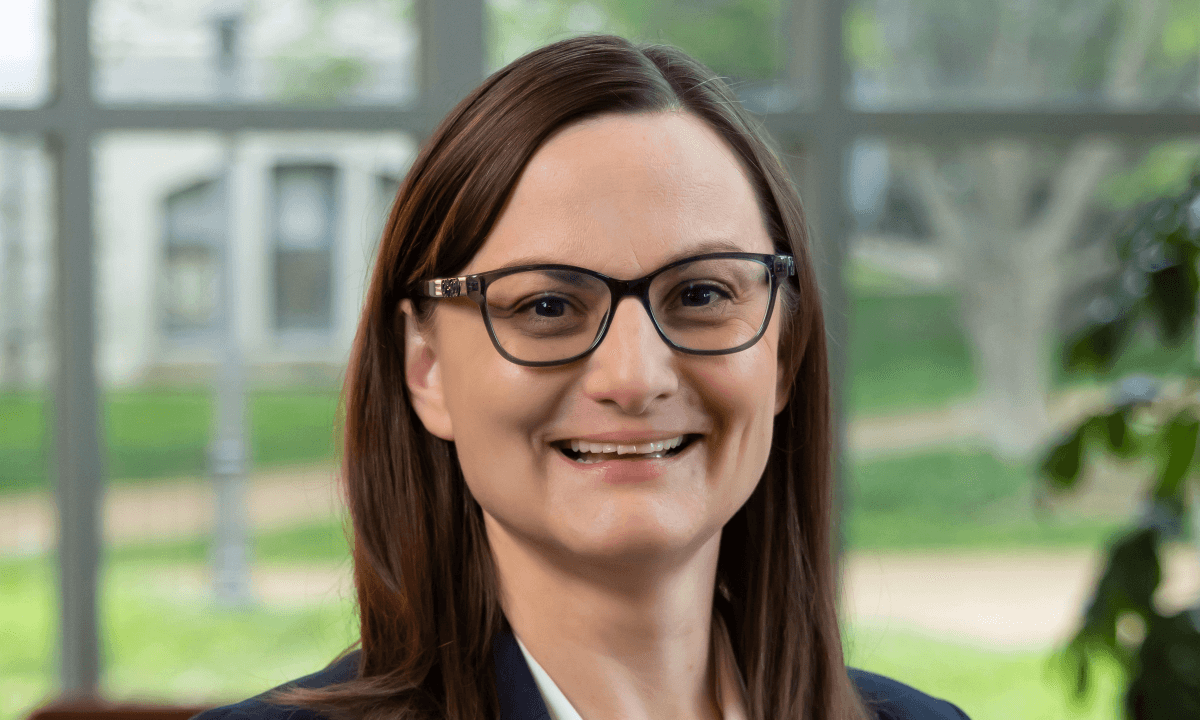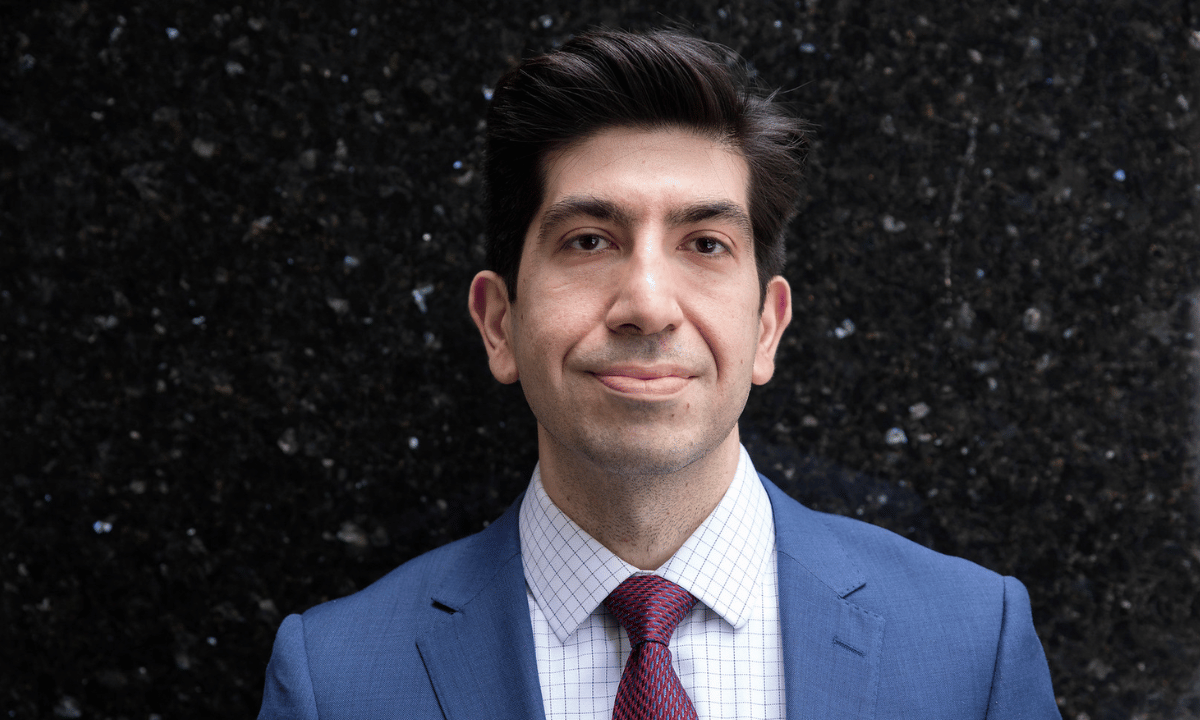by Corey Feuer and Rachael Perrotta
Vanderbilt Law School’s Energy, Environment, and Land Use Program hosted the inaugural State of the Environment Conference on March 27. The conference was made possible by the Sally Shallenberger Brown Program Fund and brought together local leaders, faculty, policymakers, and other experts who discussed their work and the challenges presented by climate change in a five-panel discussion moderated by EELU faculty.
The panels tackled the state of the environment from several angles. Check out takeaways below.
Climate Change in Tennessee
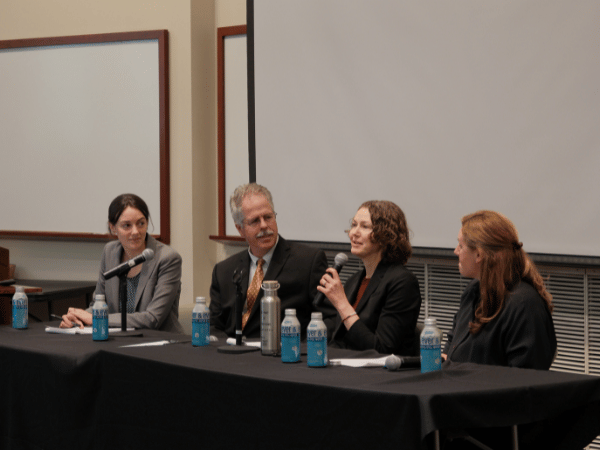 Caroline Cox, Adjunct Professor of Law and EELU Program Director, sat down with local environmental experts to discuss the state of Tennessee’s environment. Cox was joined by Greer Tidwell Jr. (JD ‘89), Deputy Commissioner for the Bureau of Conservation at the Tennessee Department of Environment and Conservation; Amanda Garcia, Tennessee Office Director at the Southern Environmental Law Center; and Erin Hafkenschiel, President of ThinkTennessee, a non-partisan think tank.
Caroline Cox, Adjunct Professor of Law and EELU Program Director, sat down with local environmental experts to discuss the state of Tennessee’s environment. Cox was joined by Greer Tidwell Jr. (JD ‘89), Deputy Commissioner for the Bureau of Conservation at the Tennessee Department of Environment and Conservation; Amanda Garcia, Tennessee Office Director at the Southern Environmental Law Center; and Erin Hafkenschiel, President of ThinkTennessee, a non-partisan think tank.
What’s the best way to measure environmental progress?
For Tidwell, progress is best measure as “what we experience when we’re actually outside. I hope that we are not just including what we rank as a city, state, or nation in terms of our greenhouse gas emissions, but are also somehow measuring the advancement in establishing a sense of place and a connectedness to the great outdoors.”
Hafkenschiel agreed with Tidwell about connection to nature but also stressed the importance of data collection in tracking environmental status. “Data is really important, because it helps tell us where we are and where we need to go,” she said.
What does environmental justice mean in states like Tennessee?
Garcia pointed to fighting climate change as a key component of environmental justice. “There are countless studies showing that communities of color and low-income communities are going to be the hardest hit by the effects of climate change,” Garcia noted.
Hafkenschiel added that residential energy burden is also important to consider. She noted that while an affordable energy burden is considered to be 6% of one’s household income, Tennessee residents living below the poverty line bear a larger cost.
“If you are a Tennessee household whose income is below 50% of the federal poverty level, you are likely spending 29% of your income on your home energy bills,” Hafkenschiel said.
Is Tennessee doing enough to mitigate climate change?
Garcia and Hafkenschiel emphasized that Tennessee must act now to avoid irreparable climate damage.
“As a state, we’re definitely behind,” Hafkenschiel said. “We are very quickly walking into this future where there are half of the states in the country that are stepping on the gas and there are half that are not. I think we need to do everything we can to step on the gas.”
Private Governance and Climate Change
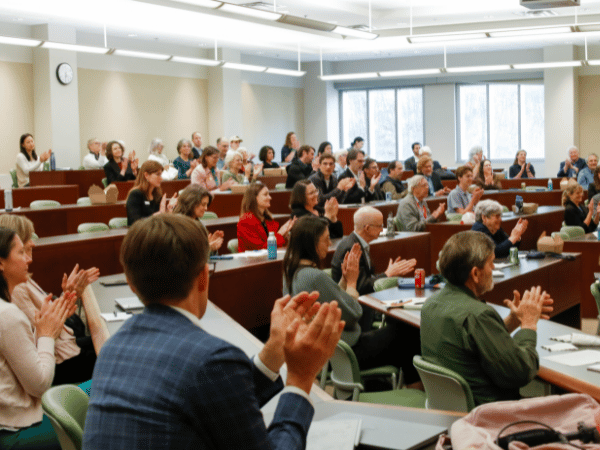 A panel on private governance and climate change was led by Dr. Jonathan Giligan, Associate Professor of Earth & Environmental Science and Civil Engineering & Environmental Engineering and the Director of the Vanderbilt Climate and Society Grand Challenge Initiative.
A panel on private governance and climate change was led by Dr. Jonathan Giligan, Associate Professor of Earth & Environmental Science and Civil Engineering & Environmental Engineering and the Director of the Vanderbilt Climate and Society Grand Challenge Initiative.
Giligan was joined by Chris Bowles (JD ‘08), Co-Chair of Bradley Arant Boult Cummings LLP’s Solar Energy Team; MaryAnne Howland, Founder and CEO of Ibis Communications; and Ryan Trahan, Visiting Scholar at VLS and Director of Vanderbilt’s Distribution of Power Project.
The panelists discussed their experience in energy law and the intersection of private governance and climate change. Howland specifically referenced a need for representation in the fight against climate change.
“One of the challenges with this movement and the challenge in front of us is that we need more voices who represent the community, especially those who are most impacted by the environment, especially environmental justice,” Howland said.
Bowles and Howland spoke about how economics drives change, particularly in climate justice. “Who drives economies? Corporate America. And who drives the revenues of Corporate America? Consumers,” Howland said.
Trahan spoke about how the inspiration for the Vanderbilt Distribution of Power Project was the realization that power within electric grids is moving toward a decentralized model, and that distribution of power affects access to technological advancements. “Focus on the cost and production of mechanisms of electricity ultimately is highly consequential [in terms of] profitability,” Trahan said.
Giligan stressed the importance of working toward climate justice as a university to continue attracting students to Vanderbilt, noting that initiatives like FutureVU rely on tuition funds. Similarly, Giligan added that many employees look to work at companies that reflect their morals and ideas, including those about environmental justice. He discussed Vanderbilt’s green efforts, such as establishing a solar farm, moving toward zero waste, and reaching zero net carbon emissions.
Transformation of the Energy Sector
Energy law scholar Jim Rossi moderated a discussion on national, regional, and local responses to what he described as a historic transformation of the energy sector to renewable energy sources. Panelists included Teresa Broyles-Aplin, President and CEO, Nashville Electric Service; Reagan Farr, President and CEO, Silicon Ranch; Scott Potter, Director, Metro Water Department; and Dr. Tina Hartert, Director, Center for Asthma and Environmental Sciences Research, Vanderbilt University Medical Center.
Here are some major takeaways from the wide-ranging discussion:
Renewable energy sources are now considered “predictable and firm” in areas of the country where the infrastructure exists to collect, store, and transmit the energy. Rossi, who serves on the Electric Power Research Institute, cited a recent visit to a power facility in Deberry, Florida, where solar energy is the “firm, reliable” resource for power generation, while natural gas is used as an intermittent, back-up energy source.
Solar power is currently the cheapest form of new power generation throughout the U.S. “We don’t need a technological breakthrough,” said Farr. “We need a whole lot of people working to deploy solar generation facilities.” Farr noted that while Silicon Ranch launched into what was considered a “niche industry” with a premium “premium product,” the company now owns and operates utility-scale projects in Tennessee, Georgia, Mississippi, Arkansas, and Kentucky.
NES purchases the bulk of its energy from the Tennessee Valley Authority, which has emphasized nuclear power over renewable energy sources such as solar and wind. However, Vanderbilt and NES have partnered with TVA to drive the development of utility-scale solar power. Vanderbilt is a subscriber to a solar farm in Bedford County, Tennessee, which is being built by Silicon Ranch, in keeping with a goal Vanderbilt announced in 2019 to power the campus entirely through renewable energy by 2050.
Clean energy promotes public health by reducing fossil fuel pollution. “The biggest driver of your health and mortality is your zip code,” Dr. Hartert said, noting that low-income populations and neighborhoods are the most effective by fossil-fuel pollution.
Climate Adaptation
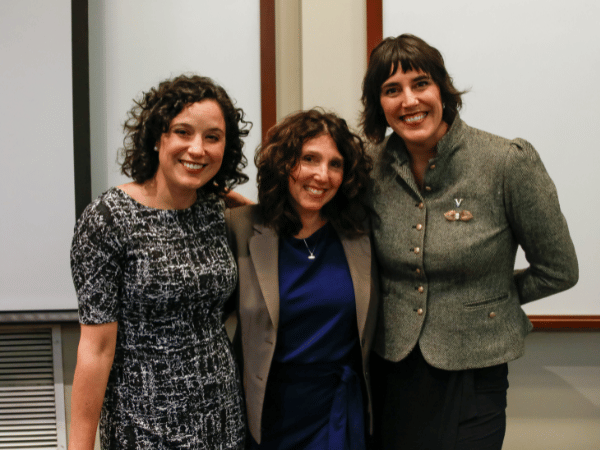 Environmental regulation scholar J.B. Ruhl moderated a panel of Metro Nashville officials and Vanderbilt experts whose work focuses on adaptation and social innovation in a discussion of climate adaption efforts underway in Nashville and Tennessee. “Global warming is now more likely than not to exceed 1.5 degrees centigrade,” Ruhl noted, “and global warming will continue to increase due to increased cumulative carbon emissions. Every increment of global warming will intensive multiple hazards, and adaptation to those hazards is a profound and urgent challenges to state and local governments.”
Environmental regulation scholar J.B. Ruhl moderated a panel of Metro Nashville officials and Vanderbilt experts whose work focuses on adaptation and social innovation in a discussion of climate adaption efforts underway in Nashville and Tennessee. “Global warming is now more likely than not to exceed 1.5 degrees centigrade,” Ruhl noted, “and global warming will continue to increase due to increased cumulative carbon emissions. Every increment of global warming will intensive multiple hazards, and adaptation to those hazards is a profound and urgent challenges to state and local governments.”
Panelists included Kendra Abkowitz, Sustainability Chief, Office of the Mayor, Metro Nashville; Janey Camp, Director, Vanderbilt Engineering Center for Transportation and Operational Resiliency and Research Professor of Civil and Environmental Engineering; Laurel Creech, Director, Metro Nashville General Services Division of Sustainability; and Jaclyn Mothupi, Director, Social Innovation, The Wond’ry, Vanderbilt University.
Some major takeaways from the discussion:
Many areas of the country, including Metro Nashville, are experiencing extreme weather events, including extreme heat, extreme cold, flooding, short-duration weather events, and wildfires.
Identifying hazards and investing in infrastructure and other improvements to mitigate the impact of severe weather events is extremely cost-effective. Camp cited research indicating that every dollar invested in mitigating damaged caused by these extreme events can lead to $6 in benefits, and Mothupi touted “avoided losses” as powerful metric to quantify the benefits of climate adaptation investments.
Rural communities are not as well-equipped to deal with severe weather events as urban areas. Panelists discussed strategies for improving resilience and protecting and strengthening infrastructure.
Local officials should prioritize threat assessments, infrastructure improvements, resilient systems and mitigation strategies now. “We didn’t get into this situation overnight, and we won’t get out of it overnight,” Abkowitz said.
Zoning and Land Use
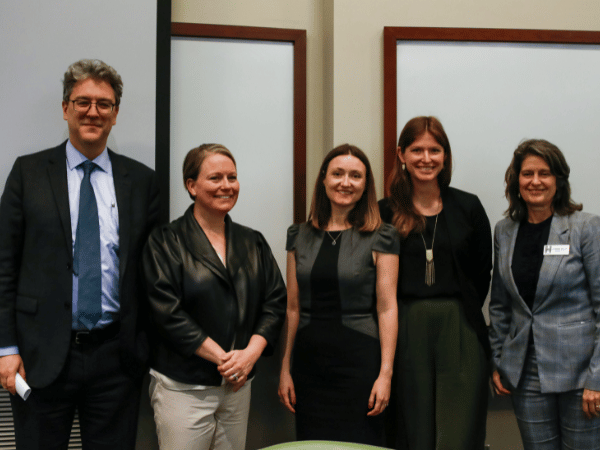 Zoning and land use are hot-button issues as cities throughout the nation struggle with unprecedent growth and rural areas in many states cope with new residents seeking affordable housing. Land use expert Christopher Serkin moderated a panel of local land use and conservation professionals who discussed planning and zoning, how related laws have evolved in recent years to address population growth and climate change, and how land use controls are now being used to implement climate mitigation efforts by local governments in cities, suburbs, and rural areas.
Zoning and land use are hot-button issues as cities throughout the nation struggle with unprecedent growth and rural areas in many states cope with new residents seeking affordable housing. Land use expert Christopher Serkin moderated a panel of local land use and conservation professionals who discussed planning and zoning, how related laws have evolved in recent years to address population growth and climate change, and how land use controls are now being used to implement climate mitigation efforts by local governments in cities, suburbs, and rural areas.
Panelists included Lucy Kempf, Executive Director, Metro Nashville Planning Department; Alice Hudson Pell, Executive Director, TennGreen Land Conservancy; Dorie Bolze, President and CEO, Harpeth Conservancy; and Carson Cooper, Senior Environmental Planner, Greater Nashville Regional Council.
Some key takeaways from the discussion:
The greater Nashville area has grown less dense, not more, over the past 25 years, due to rapid suburban growth.
Rapid development generates carbon emissions. Building operations and construction are responsible for 40 percent of global carbon emissions.
Building size has a significant impact on carbon emissions. The average size of single-family homes constructed has increased by 60 percent.
Land use controls are now vitally important to shaping how we live, and they are also central to climate change adaptation and mitigation.
Laws and regulations are challenging norms. The housing affordability crisis nationwide is challenging some of the basic assumptions underlying local zoning laws. Similarly, rural counties and towns are recognizing the need for land use regulations but are afraid of the unintended impacts of zoning regulations.
To learn more about the EELU, visit their program page.

